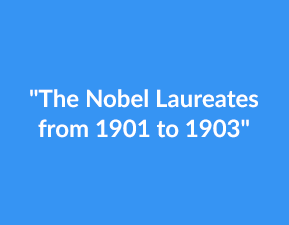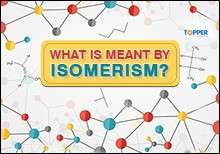The Nobel Laureates from 1901 to 1903

List of All Nobel Laureates from 1901 to 1903
By Madhurima Sarkar 02nd Nov, 2017 | 05:18 pm
ShareThe Nobel Prize is awarded for the greatest contribution towards humankind in physics, chemistry, medicine or physiology, literature and peace. It celebrates the research and inventions by several personalities who have dedicated their lives to make the world a better place to live in. Here we present the Nobel Prize winners or Nobel Laureates of the first 3 years from 1901 to 1903 and briefly describe their extraordinary work.
1901
Physics: Wilhelm Conrad Roentgen
In 1885, a powerful tool for physical experiments and examining the body’s interior was discovered by Wilhelm Conrad Roentgen—the X-rays or Roentgen rays. This achievement earned him the first Nobel Prize in Physics in recognition of the extraordinary services he rendered by the discovery of the remarkable rays subsequently named after him.
Chemistry: Jacobus Henricus van’t Hoff
van’t Hoff earned his earliest reputation in organic chemistry. He won the first Nobel Prize in Chemistry in recognition of the extraordinary services he rendered by the discovery of the laws of chemical dynamics and osmotic pressure in solutions.
Medicine: Emil Adolf von Behring
The Nobel Prize in Medicine or Physiology was awarded to Emil Adolf von Behring for serum therapy, especially its application against diphtheria, by which he opened a new road in the domain of medical science and therapy and placed in the hands of the physician a victorious weapon against illness and death.
Literature: Sully Prudhomme
Sully Prudhomme (pen name Rene Francois Armand Prudhomme) became a respected poet during the 1880s and won the first Nobel Prize in Literature in special recognition of his poetic composition, which gives evidence of lofty idealism, artistic perfection and a rare combination of the qualities of both heart and intellect. His poetry combines a Parnassian regard for formal perfection with an interest in science and philosophy.
Peace: Jean Henry Dunant, Frederic Passy
Jean Henry Dunant and Frederic Passy were jointly awarded the Nobel Peace Prize. In 1859, a battle was raging in North Italy where Dunant saw thousands of Italian, French and Australian soldiers killing each other. On his own initiative, Dunant organized aid work. Later, he wrote the book A Memory of Solferino which contained a plan—all countries should form associations to help the sick and wounded on the battlefield, whichever side they belong to.
Frederic Passy was the founder and President of the first French Peace Society, which held a congress in Paris during the 1878 world exhibition. Both as an economist and politician, he maintained that free trade between independent nations promoted peace.
1902
Physics: Hendrik Lorentz, Pieter Zeeman
The Nobel Prize in Physics was awarded jointly to Hendrik Lorentz and Pieter Zeeman in recognition of the extraordinary service they rendered by their research into the influence of magnetism upon radiation phenomena. During the 19th century, the important connection between electricity, magnetism and light were clarified by Hendrik Lorentz. In 1892, he presented his electron theory, which posited that in matter there are charged particles, electrons that conduct electricity and whose fluctuation gives rise to light. His theory could explain Peter Zeeman’s discovery in 1896 that the spectral lines corresponding to different wave lights split into several lights under the influence of a magnetic field.
Chemistry: Hermann Emil Fischer
The Nobel Prize in Chemistry was awarded to Hermann Emil Fischer in recognition of the extraordinary services he rendered by his work on sugar and purine syntheses. He showed purines form caffeine found in coffee and its equivalents in tea and cacao.
Medicine: Ronald Ross
In 1902, Ronald Ross was awarded the Nobel Prize in Medicine or Physiology for his work on malaria, by which he showed how it enters the organism and thereby laid the foundation for successful research on this disease and methods of combating it.
Literature: Theodor Mommsen
Theodor Mommsen was awarded the Nobel Prize for Literature in 1902 for the greatest living master of the art of historical writing, with special reference to his monumental work, A History of Rome.
Peace: Elie Ducommun, Charles Albert Gobat
The Nobel Peace Prize in 1902 was awarded jointly to Elie Ducommun and Charles Albert Gobat. Elie Docummun was the Secretary-General of the International Peace Bureau in Berne since its establishment in 1890. He won the prize chiefly for his work at the Peace Bureau’s Practical Programme for Friends of Peace where he maintained that people should be educated to choose peaceful solutions and that international arbitration was the means to prevent war.
Albert Gobat was awarded for his efforts to bring popularly elected representatives from various countries together at meetings and congresses. Gobat took over as Secretary General at the International Peace Bureau when Elie Ducommun died in 1906.
1903
Physics: Antoine Henri Becquerel, Pierre Curie, Marie Curie
The Nobel Prize in Physics was divided, one half was awarded to Antoine Henri Becquerel in recognition of the extraordinary services he rendered by his discovery of spontaneous radioactivity, and the other half was awarded to Pierre Curie and Marie Curie in recognition of the extraordinary services they rendered by their research on the radiation phenomena discovered by Professor Henri Becquerel.
Chemistry: Svante Arrhenius
The Nobel Prize in Chemistry was awarded to Svante Arrhenius in recognition of the extraordinary services he rendered to the advancement of chemistry by his electrolytic theory of dissociation.
Medicine: Niels Ryberg Finsen
The Nobel Prize in Physiology or Medicine was awarded to Neil Ryberg Finsen in recognition of his contribution to the treatment of diseases, especially lupus vulgaris, with concentrated light radiation, whereby he opened a new avenue for medical science.
Literature: Bjornstjerne Bjornson
The Nobel Prize for Literature was awarded to Bjornstjerne Bjornson as a tribute to his noble, magnificent, versatile poetry, which was distinguished by both freshness of its inspiration and the rare purity of its spirit.
Peace: Randal Cremer
The Nobel Peace Prize was awarded to Randal Cremer who held prominent positions of trust in the popular peace movement and took the initiative to the establishment of the Inter-Parliamentary Union in 1889. He was awarded for his work with the International Arbitration Movement.
So there you have it! A 3-year round up of the finest contributions to benefit mankind. Like and share this article with your friends so that they too can learn about the first laureates.
Important Resources
- Education Franchisee opportunity
- NCERT Solution
- CBSE Class 9 Mathematics
- NCERT Solutions for class 10 Science
- Sample Papers
- CBSE Class 9 Science
- NCERT Solutions for class 10 Maths
- Revision Notes
- CBSE Class 10 Hindi
- CBSE Class 10 English
- CBSE Class 10 English
- CBSE Class 10 Social Studies
- CBSE Class 10 Science
- CBSE Class 10 Mathematics
- Career In Science After 10
- Career In Commerce After 10
- Career In Humanities/Arts After 10
- NCERT Solutions for Class 10
- NCERT Solutions for Class 11
- Business Studies Class 12 CBSE project





